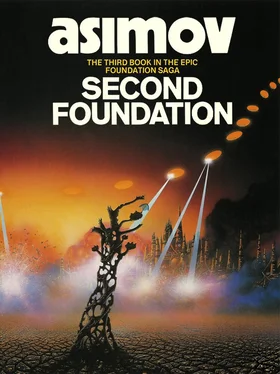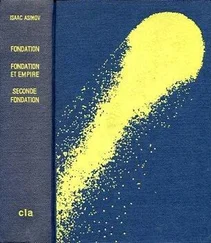“I don’t care what she said— What was that?” He strode to Callia and caught her firmly above the elbow, so that his fingers sank deeply into the soft flesh, “What did she tell you?”
“You’re hurting me. I can’t remember what she said, if you’re going to look at me like that.”
He released her, and she stood there for a moment, rubbing vainly at the red marks. She whimpered, “The little girl made me promise not to tell.”
“That’s too bad. Tell me! Now! ”
“Well, she said the Seldon Plan was changed and that there was another Foundation somewheres that was arranging to have you make an Empire. That’s all. She said Mr. Munn was a very important scientist and that the Mule’s palace would have proof of all that. That’s every bit of what she said. Are you angry?”
But Stettin did not answer. He left the room, hurriedly, with Callia’s cowlike eyes staring mournfully after him. Two orders were sent out over the official seal of the First Citizen before the hour was up. One had the effect of sending five hundred ships of the line into space on what were officially to be termed as “war games.” The other had the effect of throwing a single man into confusion.
Homir Munn ceased his preparations to leave when that second order reached him. It was, of course, official permission to enter the palace of the Mule. He read and reread it, with anything but joy.
But Arcadia was delighted. She knew what had happened.
Or, at any rate, she thought she did.
Poli placed the breakfast on the table, keeping one eye on the table news-recorder which quietly disgorged the bulletins of the day. It could be done easily enough without loss of efficiency, this one-eye-absent business. Since all items of food were sterilely packed in containers which served as discardable cooking units, her duties vis-à-vis breakfast consisted of nothing more than choosing the menu, placing the items on the table, and removing the residue thereafter.
She clacked her tongue at what she saw and moaned softly in retrospect.
“Oh, people are so wicked,” she said, and Darell merely hemmed in reply.
Her voice took on the high-pitched rasp which she automatically assumed when about to bewail the evil of the world. “Now why do these terrible Kalganese”—she accented the second syllable and gave it a long “a”—“do like that? You’d think they’d give a body peace. But no, it’s just trouble, trouble, all the time.
“Now look at that headline: ‘Mobs Riot Before Foundation Consulate.’ Oh, would I like to give them a piece of my mind if I could. That’s the trouble with people; they just don’t remember. They just don’t remember, Dr. Darell—got no memory at all. Look at the last war after the Mule died—of course I was just a little girl then—and oh, the fuss and trouble. My own uncle was killed, him being just in his twenties and only two years married, with a baby girl. I remember him even yet—blond hair he had, and a dimple in his chin. I have a trimensional cube of him somewheres—
“And now his baby girl has a son of her own in the navy and most likely if anything happens—
“And we had the bombardment patrols, and all the old men taking turns in the stratospheric defense—I could imagine what they would have been able to do if the Kalganese had come that far. My mother used to tell us children about the food rationing and the prices and taxes. A body could hardly make ends meet—
“You’d think if they had sense people would just never want to start it again; just have nothing to do with it. And I suppose it’s not people that do it, either; I suppose even Kalganese would rather sit at home with their families and not go fooling around in ships and getting killed. It’s that awful man, Stettin. It’s a wonder people like that are let live. He kills the old man—what’s his name—Thallos, and now he’s just spoiling to be boss of everything.
“And why he wants to fight us, I don’t know. He’s bound to lose—like they always do. Maybe it’s all in the Plan, but sometimes I’m sure it must be a wicked Plan to have so much fighting and killing in it, though to be sure I haven’t a word to say about Hari Seldon, who I’m sure knows much more about that than I do and perhaps I’m a fool to question him. And the other Foundation is as much to blame. They could stop Kalgan now and make everything fine. They’ll do it anyway in the end, and you’d think they’d do it before there’s any damage done.”
Dr. Darell looked up. “Did you say something, Poli?”
Poli’s eyes opened wide, then narrowed angrily. “Nothing, doctor, nothing at all. I haven’t got a word to say. A body could as soon choke to death as say a word in this house. It’s jump here, and jump there, but just try to say a word—” and she went off simmering.
Her leaving made as little impression on Darell as did her speaking.
Kalgan! Nonsense! A merely physical enemy! Those had always been beaten!
Yet he could not divorce himself of the current foolish crisis. Seven days earlier, the mayor had asked him to be Administrator of Research and Development. He had promised an answer today.
Well—
He stirred uneasily. Why, himself! Yet could he refuse? It would seem strange, and he dared not seem strange. After all, what did he care about Kalgan. To him there was only one enemy. Always had been.
While his wife had lived, he was only too glad to shirk the task; to hide. Those long, quiet days on Trantor, with the ruins of the past about them! The silence of a wrecked world and the forgetfulness of it all!
But she had died. Less than five years, all told, it had been; and after that he knew that he could live only by fighting that vague and fearful enemy that deprived him of the dignity of manhood by controlling his destiny; that made life a miserable struggle against a foreordained end; that made all the universe a hateful and deadly chess game.
Call it sublimation; he, himself did call it that—but the fight gave meaning to his life.
First to the University of Santanni, where he had joined Dr. Kleise. It had been five years well-spent.
And yet Kleise was merely a gatherer of data. He could not succeed in the real task—and when Darell had felt that as certainty, he knew it was time to leave.
Kleise may have worked in secret, yet he had to have men working for him and with him. He had subjects whose brains he probed. He had a University that backed him. All these were weaknesses.
Kleise could not understand that; and he, Darell, could not explain that. They parted enemies. It was well; they had to. He had to leave in surrender—in case someone watched.
Where Kleise worked with charts; Darell worked with mathematical concepts in the recesses of his mind. Kleise worked with many; Darell with none. Kleise in a University; Darell in the quiet of a suburban house.
And he was almost there.
A Second Foundationer is not human as far as his cerebrum is concerned. The cleverest physiologist, the most subtle neurochemist might detect nothing—yet the difference must be there. And since the difference was one of the mind, it was there that it must be detectable.
Given a man like the Mule—and there was no doubt that the Second Foundationers had the Mule’s powers, whether inborn or acquired—with the power of detecting and controlling human emotions, deduce from that the electronic circuit required, and deduce from that the last details of the encephalograph on which it could not help but be betrayed.
And now Kleise had returned into his life, in the person of his ardent young pupil, Anthor.
Folly! Folly! With his graphs and charts of people who had been tampered with. He had learned to detect that years ago, but of what use was it? He wanted the arm; not the tool. Yet he had to agree to join Anthor, since it was the quieter course.
Читать дальше
Конец ознакомительного отрывка
Купить книгу











